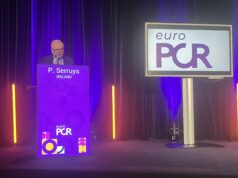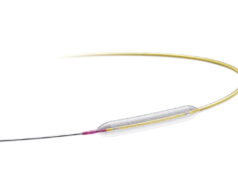 Patients at high risk for acute kidney injury (AKI), the most common complication of percutaneous coronary intervention (PCI), had a significant reduction in AKI when the ePRISM clinical decision support platform (Terumo) was used, a study published in the Journal of the American Medical Assocation (JAMA) has concluded.
Patients at high risk for acute kidney injury (AKI), the most common complication of percutaneous coronary intervention (PCI), had a significant reduction in AKI when the ePRISM clinical decision support platform (Terumo) was used, a study published in the Journal of the American Medical Assocation (JAMA) has concluded.
“Contrast-associated AKI is the most common complication of coronary angiography and PCI, and contributes to higher costs for healthcare systems and negative outcomes for patients,” said John A. Spertus (University of Missouri-Kansas City, Kansas City, USA) co-author of the study. “By incorporating ePRISM to define ‘safe’ contrast limits for each individual patient, coupled with protocol-driven hydration, physicians were able to deliver much safer care. Using tools like ePRISM to improve outcomes represents the future of precision medicine in routine clinical practice.”
ePRISM uses the most valid risk model available to predict—on an individual basis—patients’ risks for AKI and establishes patient-specific contrast limits to help guide safer PCI. Armed with this knowledge, clinicians can make informed, pre-procedure treatment decisions and modify their approaches during treatment to minimize risk and improve outcomes.
The study participants included 31 invasive cardiologists from three cardiac cath labs in Alberta, Canada. Physicians performed 7,820 procedures among 7,106 patients who had a predicted AKI risk of greater than 5%. When ePRISM was used, the proportion of procedures exceeding the safe contrast limits was reduced from 51.7% to 38.1%.
During the intervention period, cardiologists received educational outreach, computerised clinical decision support on contrast volume and haemodynamic-guided intravenous fluid targets, and audit and feedback. During the control period, cardiologists provided usual care and did not receive the intervention training or tools. The primary outcome was AKI. There were 12 secondary outcomes, including contrast volume, intravenous fluid administration, and major adverse cardiovascular and kidney events. The analyses were conducted using time-adjusted models.
The results of the trial were highlighted by Terumo Corporation in a press release.













